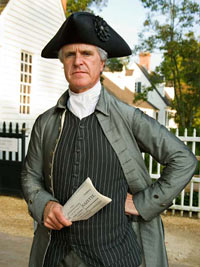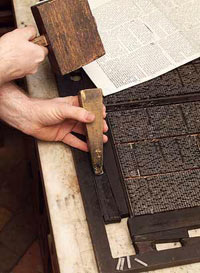Page content
Alexander Purdie
- Likely born in Scotland
- Emigrates to Virginia by 1764
- Gains prestigious public printer position in 1775
- Shows increasing support to patriot cause
- Dies in 1779, leaving a widow and three sons
Early Career and Partnership
Alexander Purdie was born by 1743, perhaps in Scotland, but his birthplace is not stated in surviving records. He was in Williamsburg working in Joseph Royle’s printing office by 1764 and possibly earlier. In June 1766, Purdie went into partnership with John Dixon, another local printer. Together they “purchased all the materials, stock in trade, &c. belonging to . . . Hunter and . . . Royle.”
Rivalry Gives Way to Lucrative Post
The next year, Purdie and Dixon’s rival, William Rind, was appointed public printer. This post was a lucrative colonial position for publishing Virginia’s laws. Purdie finally achieved that office after both William Rind and his wife, Clementina, who briefly published a Gazette and served as public printer, died. In October 1775, Purdie was also appointed postmaster.
Dixon ended the partnership with Purdie in 1775 because William Hunter, Jr., had come of age at that time and came into his half of the business. Purdie continued on his own.
Purdie’s Political Stance
Purdie’s politics were conservative, especially so while in partnership with Dixon; later when publishing solo, Purdie was a somewhat guarded voice favoring the patriots’ cause.
Through the course of the American Revolution, Purdie would change his masthead several times to reflect his solidarity with the American cause. Early on, the masthead read, “Thirteen United Colonies” and “United we stand, divided we fall.” Later, a graphic of a coiled snake accompanied the slogan, “Don’t tread on me.” In July of 1776, Purdie’s Gazette published the Declaration of Independence in its pages.
Married Twice with Four Sons
Purdie’s wife Mary died in March 1772, leaving him with four young sons, James, Hugh, Alexander, and William. Before the year was out, Alexander had married Peachy Davenport, a local spinster of good family who owned property of her own, and was six years older than he.
Death and Estate
Purdie died on April 16, 1779, after “a tedious and painful illness.” In his will he left his wife five slaves. All of the rest of the personal property was to be sold, and the residue divided among his heirs. One of his sons, James, predeceased him. Peachy’s sister Martha and her husband Augustine Davis took over the operation of Purdie’s printing office while Purdie’s surviving sons were underage.


